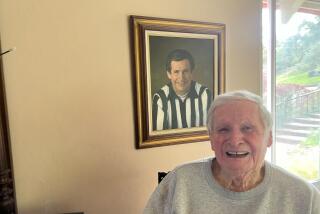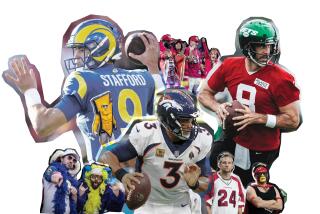A LOOK AT TWO OF SUNDAY’S RAIDER, RAM OPPONENTS : A NEW BALLGAME : The Expected Excellence of Don Shula’s Teams Is Nowhere to Be Found in Miami
- Share via
MIAMI — For most of two decades, it has been customary for football players to welcome a trade to the Miami Dolphins.
They like to play for Don Shula, who has been the National Football League’s most successful coach since he took command here in 1970.
Former Dolphin halfback Mercury Morris was talking about this the other day. Mindful of the time he spent in prison for a drug conviction, he chose his words carefully.
“I would want my kid to play for Shula because he believes in excellence,” Morris said. “Of course, my kid would have to play under an assumed name.”
If excellence has been the sign of Shula, it was strangely missing when the 1986 season began last month.
The Dolphins lost four of their first five games while playing wholly uncharacteristic Shula football. For a while, they even led the AFC East in most penalties. They usually lead the league in fewest.
Embarrassingly, on their way to the locker room one day in September, the Dolphins had to be called back to the field when the officials ruled offsetting penalties on the final play of the half.
“It was the first time,” Shula said, “that I’ve ever been called back out of the men’s room.”
The first--but possibly not the last. There is a chance that hard times are settling in on the Dolphins.
Some think their problem is as basic as you can get. Shula seems to be running out of good players. At long last, the well may be drying up on him. In any case, the Dolphins in recent years have experienced a series of inauspicious drafts. In a business where doing well depends, fundamentally, on drafting well, Shula might have a hard time making a living as a player personnel director.
That is the view of some of his peers, who rank him as perhaps the most effective football teacher in NFL history and at the same time as one of the game’s least effective scouts.
“Nobody’s perfect,” a rival said. “Shula is like a great driver and chipper who doesn’t putt too well.”
Shula’s best players were here in the days when the late Joe Thomas was recruiting champions for Miami, and later when Bobby Beathard was here, and at times, when he was getting some input from the league’s highest-salaried defensive coordinator, Bill Arnsparger, who left for LSU.
Today, Miami’s defensive talent, particularly, doesn’t seem to measure up to the demands of a more aggressive age.
Or as Edwin Pope, sports editor of the Miami Herald, said: “Shula is trying to fight a guerrilla war without the guerrillas.”
The talent shortfall in Miami’s recent drafts has been compounded by tragedy--the accidental deaths of three young front-line players--and by an abnormal number of career-affecting injuries. The weight of all this appears to be sinking the ship.
Still, nobody who knows him is really counting Shula out.
“What is he this week, 2-4?” former fullback Larry Csonka said in a visit with Miami writers. “So what? Don always straightens things out. Why panic?”
The storm, however, hasn’t blown over. The Miami defense has been slipping since 1983, Arnsparger’s last year, when it stood 7th in the NFL. In ’84 and ’85 it was 19th and 23rd, and this year it’s 28th.
There are no such problems in the pass offense. The Dolphins will face the Raiders here Sunday with a young fellow who is a candidate for greatest passer of all time, Dan Marino.
“Statistically, Marino is down this year, but artistically he’s greater than ever,” Jet executive Mike Hickey said from New York. “He’s carrying the ballclub on his arm.”
Indeed, some critics suggest that that’s precisely what’s wrong with Miami.
As a football team, the Dolphins are almost comically out of trim. They can’t run the ball. They can’t rush a passer or cover swift receivers. They mostly just sit back and watch Marino whip 50 or 55 passes a week, most of them strikingly on target.
“Miami today is a one-man band, and 45-38 isn’t Shula football,” another sports editor said. “Shula is Csonka and Kiick pounding one out, 20-7, or Vern den Herder blocking an extra point to win. He’s lost that balance.”
Shula admits as much. But he asks: “What do you want me to do--take the ball out of Marino’s hand? That’s exactly what the teams we play against are hoping I’ll do.”
At 56, Shula knows what’s needed. He realizes that he’d have a tougher ground game if he practiced it more during the week.
“We’d spend the time to establish the run if we didn’t have him,” Shula said flatly.
Him is a passer who unbalances the Dolphins as surely as Dan Fouts does it for the San Diego Chargers.
In last week’s statistical reckoning, Marino and Fouts were the 1-2 passers in a 28-team league in which their defenses stood 27th and 28th.
“I know that. I just don’t see any correlation between great passing and defensive trouble,” Shula said. “There are so many other causes.”
At Miami, there are five major causes:
--In yielding 50 points to the Chargers last month and 51 to the Jets, the Dolphins failed to adapt to the modern mainstream aggressive approach of new defensive coordinator Chuck Studley.
“Our old style was always to give the other team the short play and make them work down the field,” said linebacker Bob Brudzinski, describing the finesse defenses long favored by Shula and Arnsparger.
Most Miami players were drafted for Arnsparger’s style and don’t seem suited to Studley’s.
“Right now, we’re somewhere in between,” said Shula.
In a football game, that isn’t always the best place to be.
--Dolphin deaths and injuries have also taken their toll. A No. 1 draft choice, running back David Overstreet, was killed in a 1984 car accident. Another No. 1, linebacker Larry Gordon, died jogging in 1983. Still another linebacker, Rusty Chambers, was killed in a 1981 car accident.
“Tragedies like that hurt a football team twice ,” said Raider General Manager Al LoCasale. “First you lose them as players, then you have to change the draft to make up for them. You interrupt the way you were building.”
Injuries, moreover, have hit Miami harder than most teams.
‘Their great old defensive players are either gone or too slow now,” Miami News columnist Tom Archdeacon said, naming the prematurely retired A.J. Duhe and others.
“Glen Blackwood hasn’t played a down,” he said. “Hugh Green is out for the year. Don McNeal is typical of what’s left. His five operations have slowed him down, and he used to be the star of the secondary. Bob Baumhower is kind of a shadow of what he was.”
--The long lead that old pros like Shula and Al Davis once enjoyed over their competition in the NFL isn’t there any more. Everyone is smarter now.
--The imbalance of the Dolphins isn’t conducive to winning.
--”The draft hasn’t done it for us lately,” Shula said, and that’s most important.
Itemizing some typical trouble areas in recent drafts, he said:
“In 1983, we went for a couple of well recommended defensive linemen. But Mike Charles (No. 2) has been a disappointment, and Charles Benson (No. 3) is gone.
“In 1984, we traded up for the highest-rated linebacker, Jackie Shipp, who’s also been disappointing. Our second pick that year, (linebacker) Jay Brophy, is tough but doesn’t have the movement.”
At the Herald, Pope said that one chronic problem is the Dolphins’ constant position in the draft, toward the bottom.
“The super-studs only come on the first round,” he said. “When you draft 26th every year, you never get a shot at one.”
Put it all together, and Shula may only have one chance to turn the season around. There are 45 bodies on the Dolphin roster, and he remains the old professor of NFL coaches. If they can’t play when he gets them, he’ll have to teach them.
More to Read
Go beyond the scoreboard
Get the latest on L.A.'s teams in the daily Sports Report newsletter.
You may occasionally receive promotional content from the Los Angeles Times.










